In response to the ongoing economic crisis, Paul Stevens, our Publisher for Business, Management and Economics, has curated this booklist that focuses on the dangers of concentrating on economic growth while ignoring the need for wider social change.
A new government has plunged the UK’s economy into crisis, thanks in no small part to its ideological fixation on the need for growth. The sense that we’re heading in a dangerous direction is overwhelming, especially given the complexity of the impact of the policies being discussed.
Our books on the relationship between economy and society are for academic, professional and general readers who need fresh perspectives that move beyond mere critique and put forwards hopeful and constructive visions for a more just and sustainable world. You don’t have to be an expert in macroeconomics to grasp the potential for radical social change.
Read on for books and journal articles that offer answers…
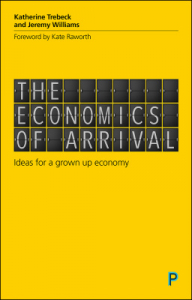 The Economics of Arrival: Ideas for a Grown-Up Economy
The Economics of Arrival: Ideas for a Grown-Up Economy
Katherine Trebeck and Jeremy Williams
What do we want from economic growth? What sort of a society are we aiming for? This ground-breaking book argues that, rather than growth, the challenge is now to make ourselves at home with our wealth, and to explore the possibility of ‘arrival’.
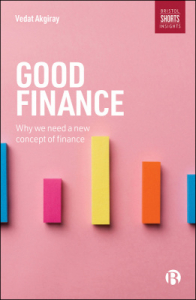
Good Finance: Why We Need a New Concept of Finance
Vedat Akgiray
Just as we need good food for good health, so too do we need ‘good finance’ for social and economic wellness. Vedat Akgiray presents a timely critique of extreme financialisation, of the economics profession’s flawed modelling approach and the continuing blind faith in the efficient market hypothesis.
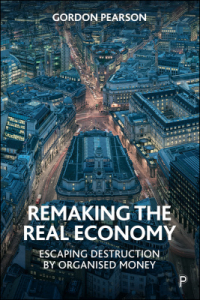
Remaking the Real Economy: Escaping Destruction by Organised Money
Gordon Pearson
Debunking the myths around the current economic belief systems, Gordon Pearson shows how mainstream perspectives work for the benefit of the organised money establishment, while causing all manner of destructions, inequalities and frauds, all conspiring against the common good.
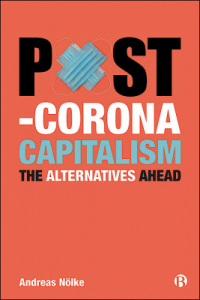 Post-Corona Capitalism: The Alternatives Ahead
Post-Corona Capitalism: The Alternatives Ahead
Andreas Nölke
Covering all the major aspects of contemporary capitalism that have been affected by the pandemic, Andreas Nölke signposts a new era for global capitalism, offering alternatives for future economic development in the wake of COVID-19.
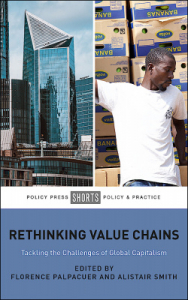 Rethinking Value Chains: Tackling the Challenges of Global Capitalism
Rethinking Value Chains: Tackling the Challenges of Global Capitalism
Edited by Florence Palpacuer and Alistair Smith
Thinking creatively about how to reform the current economic system, this is essential reading for those interested in building sustainable alternatives at local, regional and global levels.EPUB and EPDF available open access under CC-BY-NC-ND licence.
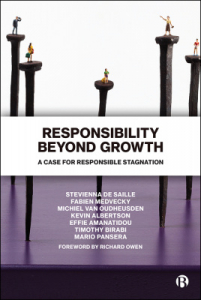 Responsibility Beyond Growth: A Case for Responsible Stagnation (Bristol University Press)
Responsibility Beyond Growth: A Case for Responsible Stagnation (Bristol University Press)
Stevienna de Saille, Fabien Medvecky, Michiel van Oudheusden, Kevin Albertson, Effie Amanatidou, Timothy Birabi and Mario Pansera
Drawing on insights from economics, politics, and science and technology studies, this book proposes the concept of ‘responsible stagnation’ as an expansion of present discussions about growth, degrowth, responsibility and innovation within planetary limitations.
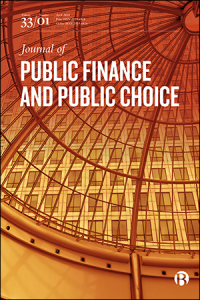 From the Journal of Public Finance and Public Choice
From the Journal of Public Finance and Public Choice
State–market entanglement: some implications for the theory of public finance
Zachary Kessler and Richard E. Wagner
Macroeconomic policy as an epistemic problem
Aris Trantidis and Peter J. Boettke
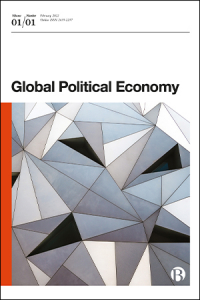 From Global Political Economy
From Global Political Economy
Critical junctures and state actors: towards a micro-strategies approach of the global political economy [Free Access]
Inga Rademacher
Constitutional vulnerability: challenges for feminist monetary re-design in post-COVID-19 political economies [Free Access]
Kai Roland Green
Bristol University Press/Policy Press newsletter subscribers receive a 25% discount on all books – sign up here.
Follow Transforming Society so we can let you know when new articles publish.
The views and opinions expressed on this blog site are solely those of the original blog post authors and other contributors. These views and opinions do not necessarily represent those of the Policy Press and/or any/all contributors to this site.
Image JoeyCheung via Shutterstock


